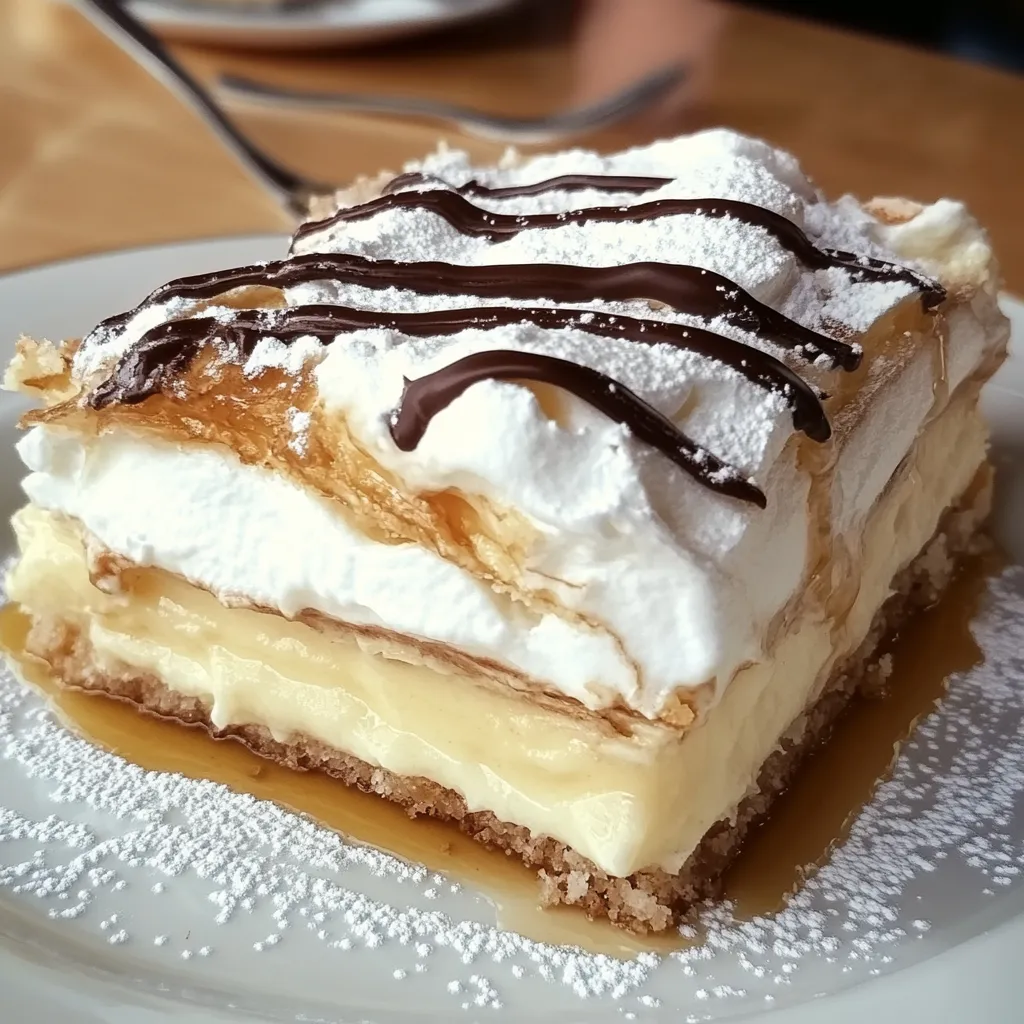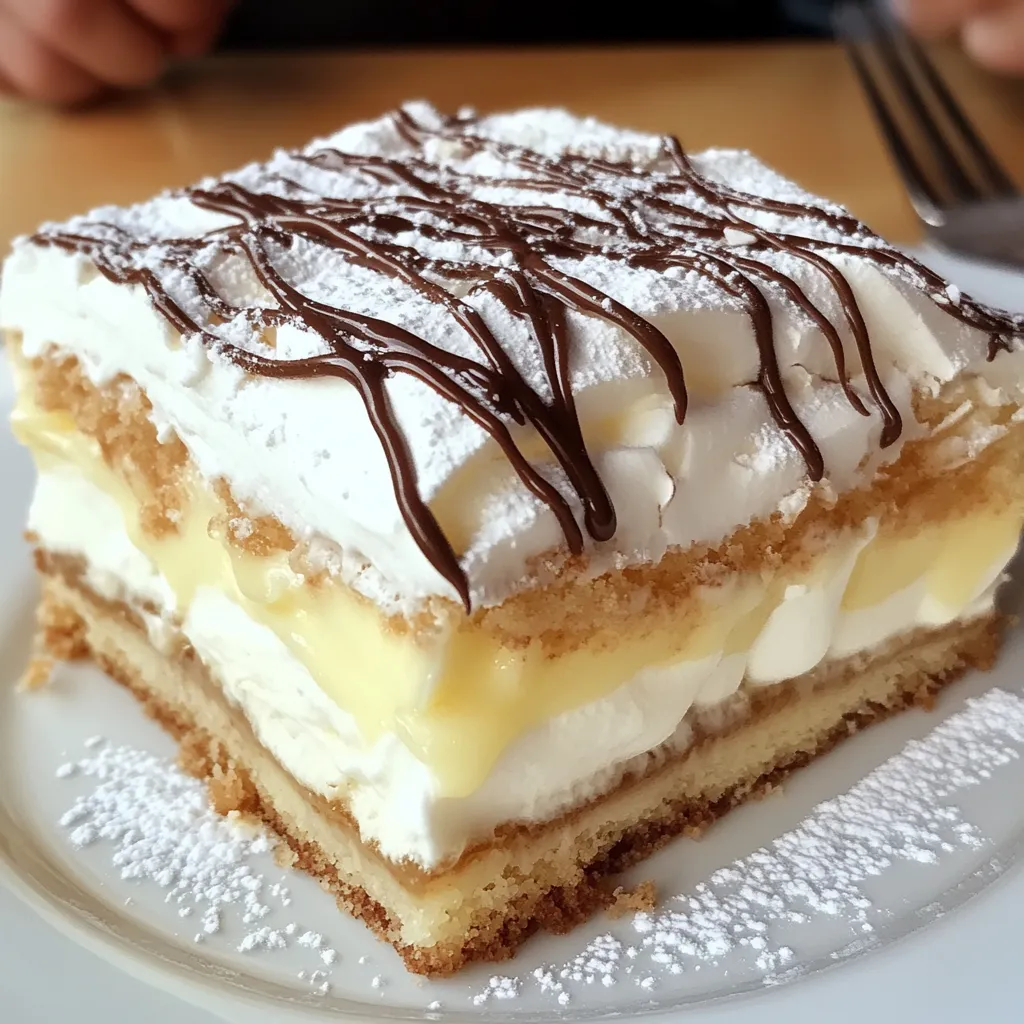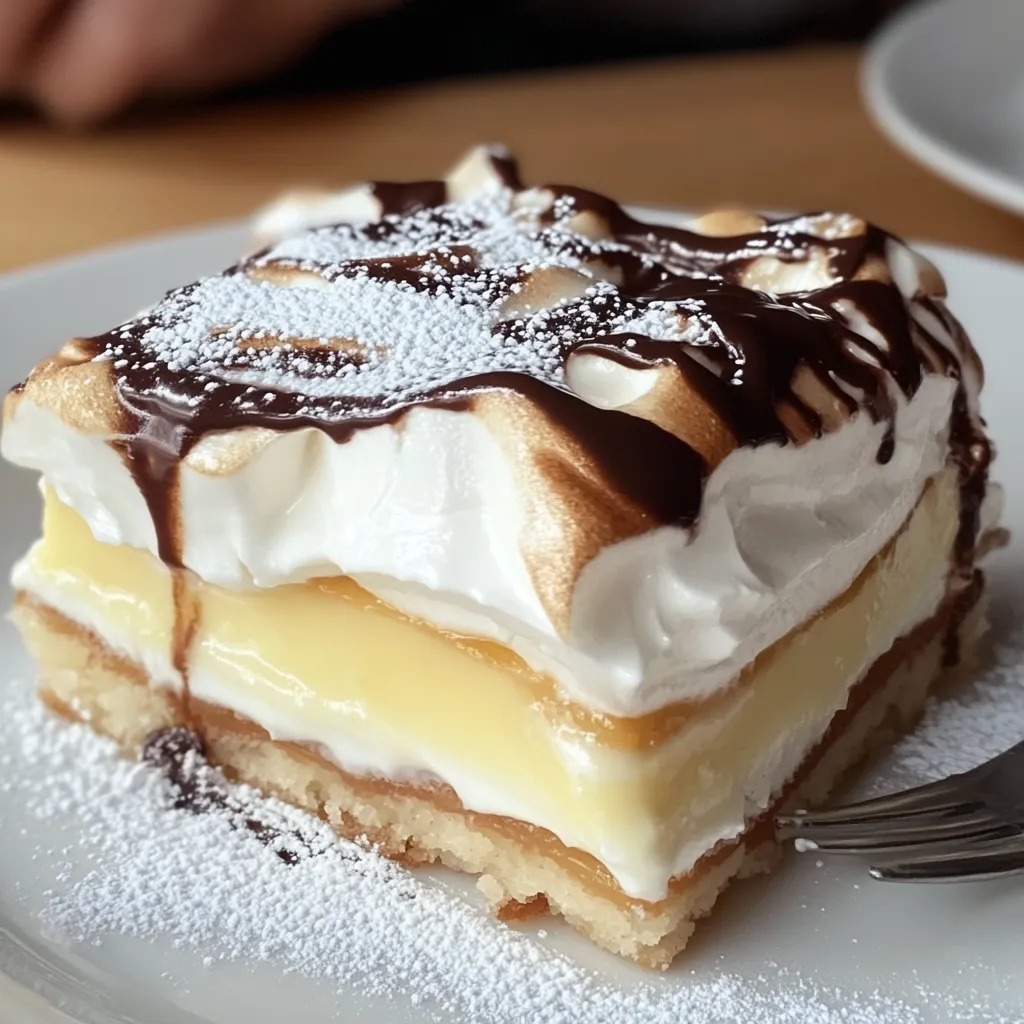 Pin it
Pin it
Airy pâte à choux pastry forms a delicate base that cradles velvety vanilla custard filling, all crowned with billowy whipped topping in this remarkable dessert that captures the essence of French cream puffs in convenient cake form. This ingenious creation delivers the sophisticated flavors and textures of traditional pastry shop éclairs and profiteroles without the fuss of individual assembly.
I first encountered this recipe at a friend's dinner party where it was the undisputed star of the evening. After watching guests return for second and third slices, I requested the recipe immediately. Making it for my own family resulted in similar enthusiasm—my husband, typically indifferent to desserts, claimed it was 'the perfect balance of not-too-sweet and incredibly satisfying.' It has since become our signature contribution to potlucks and celebrations.
Essential Ingredient Selection
- Quality Butter: Choose unsalted European-style butter with higher fat content for the pastry base. The elevated butterfat percentage creates exceptional flavor and contributes to the proper rise of the pâte à choux.
- Fresh Eggs: Select large, room-temperature eggs for optimal incorporation into the dough. Room temperature eggs create more volume and integrate more smoothly than cold eggs.
- Cream Cheese: Use full-fat, brick-style cream cheese at proper room temperature. The slight tanginess balances the sweetness while adding richness to the pudding layer.
- Instant Pudding Mix: Choose premium vanilla pudding mix for reliable thickening properties. The instant variety creates the perfect consistency that complements the cream cheese without becoming too dense.
- Whipped Topping: Select extra-creamy varieties or substitute homemade whipped cream stabilized with a small amount of gelatin. This final layer should be light yet substantial enough to hold its shape when sliced.
Mastering The Technique
- Perfect Pâte à Choux Development:
- Begin with the precise ratio of water to butter, bringing them to a full rolling boil before adding flour. The vigorous boil creates steam that is crucial for proper pastry rise. When incorporating flour, stir with purpose using a wooden spoon until the dough pulls away from the sides of the pan and forms a cohesive ball. This initial cooking of the flour develops the starches that give structure to the pastry. Allow the mixture to cool for exactly 5 minutes—long enough to prevent cooking the eggs upon addition but not so long that the dough becomes too firm to incorporate them properly.
- Strategic Egg Incorporation:
- Add eggs one at a time, beating thoroughly after each addition until completely incorporated before adding the next. This gradual approach prevents the mixture from separating and ensures proper texture. The finished dough should be glossy and thick, falling from the spoon in a V-shaped ribbon that slowly disappears back into the mixture. This visual cue indicates the perfect consistency for spreading while maintaining enough structure to rise properly during baking.
- Optimal Spreading Technique:
- Use an offset spatula to spread the dough evenly across the prepared pan, paying special attention to the corners. The layer should be uniformly thick, approximately 1/4-inch throughout, to ensure even baking. Create subtle waves rather than a perfectly smooth surface, as these create additional texture in the finished crust. The thin, even layer maximizes the crisp-to-chewy ratio that makes this cake base exceptional.
- Perfect Filling Integration:
- Ensure cream cheese reaches complete room temperature before mixing to prevent lumps in the finished filling. Beat cream cheese alone first until completely smooth, then gradually incorporate pudding mix and milk. When combining, use medium speed on your mixer rather than high, which can incorporate too much air and create a filling that's too airy. The ideal consistency should be smooth, dense enough to hold its shape when sliced, but soft enough to spread easily over the cooled crust without tearing it.
- Proper Chilling Protocol:
- Refrigerate the assembled cake for a minimum of 2 hours, preferably 4-6 hours before serving. This crucial chilling period allows the layers to set while flavors meld into cohesive harmony. The pastry base continues to evolve during refrigeration, softening slightly from the moisture in the filling to create the signature texture that distinguishes cream puffs. For optimal flavor and texture contrast, serve the cake cold but allow it to stand at room temperature for 10-15 minutes before serving.
 Pin it
Pin it
My grandmother always insisted that the secret to exceptional pâte à choux lies in respecting the process. 'You cannot rush the cooking or cooling,' she would say while demonstrating the proper technique. When I first attempted this cake and tried to speed up by adding eggs to still-hot dough, the resulting dense, flat crust taught me the wisdom in her patience. Now I measure the cooling time precisely and achieve a perfectly airy, crisp base every time.
Serving Suggestions
Garnish with fresh berries for color contrast and complementary flavor. Drizzle individual slices with warm chocolate sauce for added indulgence. Serve alongside strong coffee to balance the richness.
Creative Variations
Create a chocolate version with chocolate pudding and cocoa in the crust. Add almond extract and slivered almonds for a French patisserie touch. Incorporate lemon zest in the filling for bright citrus notes. Layer thinly sliced strawberries between the filling and topping.
Storage Strategy
Refrigerate in the original pan, covered with plastic wrap, for up to 3 days. The texture actually improves during the first 24 hours as the components meld. Individual slices can be frozen for up to one month; thaw overnight in the refrigerator for best results.
This Cream Puff Cake represents the perfect marriage of convenience and sophistication, creating a dessert that impresses without demanding pastry chef skills. Its balance of textures and flavors, combined with make-ahead practicality, makes it a reliable star for any occasion that calls for something special.
 Pin it
Pin it
Frequently Asked Questions
- → Can I make this cake ahead of time?
- Yes, this cake is perfect for making ahead! It actually benefits from chilling for at least 2 hours, but can be made up to a day in advance and stored in the refrigerator. The flavor develops nicely as it sits.
- → Why did my pastry crust collapse after baking?
- Some settling is normal with choux pastry, but excessive collapse might be caused by opening the oven door too early during baking or not baking long enough. Make sure to bake until golden brown and avoid opening the oven for the first 20 minutes.
- → Can I use homemade whipped cream instead of whipped topping?
- Absolutely! Whip 1 cup of heavy cream with 2-3 tablespoons of powdered sugar until stiff peaks form, then use it in place of the whipped topping. Homemade whipped cream will give a richer flavor but may not hold up quite as long.
- → Why is my filling too runny?
- Make sure you're using instant pudding mix (not the cook-and-serve variety) and cold milk. Also, ensure the cream cheese is well-beaten before adding other ingredients. If it's still too runny, chill the filling for 30 minutes before spreading it on the crust.
- → Can I freeze this cream puff cake?
- While you can freeze it, the texture might change slightly upon thawing. If you do freeze it, thaw it overnight in the refrigerator. The crust won't be quite as crisp, but it will still taste delicious.
